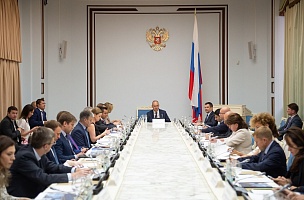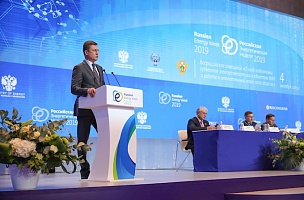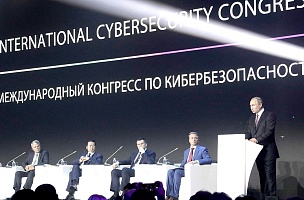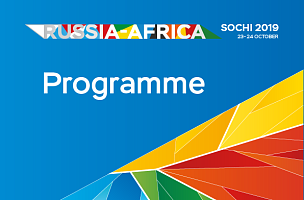The Roscongress Foundation, together with the STI Competence Centre for Big Data Storage and Analysis Technologies based at Lomonosov Moscow State University, prepared a report entitled ‘Key Trends in Russian Economic Development 2022’. It is based on the content of key discussions of the programmes of the country’s largest business events — the St. Petersburg International Economic Forum, Russian Energy Week and Eastern Economic Forum — and contains 10 key trends in the country’s economic development. Similar studies will be issued in cooperation with analytical partners on a regular basis.
«The activities of the Roscongress Foundation accurately reflect the global challenges of our time, including the dramatically changing economic conditions, the geopolitical and energy crises, and the process of transition to a multipolar world order. All of them have a significant impact on the development of our country and require comprehensive and effective measures on the part of the state, business, and society. I am confident that this report will contribute to the adoption of appropriate decisions,» said Anton Kobyakov, Advisor to the President of the Russian Federation.
The full report is available on the ROSCONGRESS.ORG Information and Analytical System.
The key trends include:
1. Refocusing trade relations towards Asian countries in search of new counterparts and ways to avoid sanctions
The introduction of another round of sanctions by Western countries has had a negative impact on domestic businesses and caused some of them to cease operations. One of the most promising solutions in this situation is to gradually rebuild logistics chains toward Southeast, particularly to China, India, Turkey, and other friendly countries. Russia’s trade turnover with these countries has increased significantly in recent times. In the context of sanctions pressure, goods similar to those that have disappeared from the Russian market, primarily high-tech goods, are expected to be imported from Asia Pacific.
2. New Silk Road
Integration of the Russian Federation into the New Silk Road system, including through the development of the Baikal—Amur Mainline and the Trans-Siberian Railway, will make it possible to provide transport and economic links between Russian regions and Far Eastern seaports as well as deepen economic cooperation not only with China and neighbouring countries, but also with all countries that use this transport corridor.
3. Logistics: rerouting logistical chains and creating new logistical corridors
The new geopolitical reality dictates the need to reorient logistics corridors and create new transport infrastructure. The most promising solutions are the North—South transport corridor, which provides an opportunity to expand trade and investment partnerships within Eurasia, as well as the development of east-oriented logistics corridors. Another important transport artery linking Europe and Asia is the Northern Sea Route. In addition, the Government of the Russian Federation has planned unmanned logistics projects — Unmanned Logistics Corridors and Unmanned Freight Delivery.
4. Development of transport infrastructure, elimination of regional transport disparities, and digitalization of the transport sector
One of the key development areas of the Russian Federation is increasing spatial connectivity and transport accessibility of the territories. In this regard, widespread work is being done to upgrade the Northern Sea Route, to implement the concept of the One Eurasia: RAZVITIE Trans-Eurasian Belt (TENR) — Integral Eurasian Transport System (IETS) Megaproject, and to improve the air transport accessibility of Russian regions. «This year, a significant part of the changes in the economy is related to the transport industry. Changing trade relations with foreign countries and the associated restructuring of logistics can be seen not only as barriers, but also as new opportunities for Russian transport. Our country has sufficient potential to respond to global challenges and threats, which can be implemented through large-scale projects in the transport sector. Thus, under the leadership of Russian scientists, academicians Viktor Sadovnichiy and Gennady Osipov, a concept of the TENR-IES Social Megaproject was developed, the premise of which is to create a unified infrastructure system in our country with access to Europe, Asia, and Africa. The development of such a transport corridor could both produce significant economic effects and serve the objectives of Russia’s geopolitical security,» noted Oleg Karasev, Vice Rector of Lomonosov Moscow State University.
5. Digitalizing segments of Russian economy as part of the global digital transition
Introduction of digital and intelligent technologies and solutions based on them is an integral part of the digital transition of key sectors of the economy and social sphere in the Russian Federation. Alexey Beloshitsky, Executive Director of the NTI Centre of Competence in Big Data Storage and Analysis Technologies, emphasized the country’s high potential in terms of digitalization of economic sectors, and highlighted the main conditions for its implementation: «The introduction of information technologies is happening in all areas of economic activity. As the pace of science and technology development accelerates, and under the influence of IT import substitution, this trend will become increasingly evident.» A number of conditions are necessary to achieve the goals set in the digital sphere: a reliable information infrastructure, human capital, and a favourable institutional environment. Development in this area will be successful if all key players — government, business, and academia — are involved. The most promising sectors for the implementation of digital solutions are healthcare, transport, agriculture, fishery, public administration, education, construction, and urban economy.
6. Protecting national interests: technological sovereignty and the development of information security systems
Unprecedented external constraints have underscored the importance of creating favourable conditions for the advanced development of the scientific and technological sphere and overcoming technological dependence on foreign countries for the efficient and sustainable functioning of the country’s economy. Currently, the Russian Government has set a number of technological development goals, one of which is to achieve technological sovereignty.
7. Oil and gas 2.0: refocusing exports, developing domestic manufacturing, and digitalization
The development of the fuel and energy complex ensures the country’s energy security and also has a direct impact on the development of the Russian economy and social sphere. Among the most important ways to upgrade the fuel and energy complex with regard to the extraction, processing, use and export of raw energy resources, first of all, is the need to reorient exports to Asia Pacific. They also include developing new and reconstructing existing material, technical resources and element bases, and implementing the digital transformation of the complex.
8. ‘Energy of the future’: energy transition to carbon-free and low-carbon energy sources; prospects for green energy development in Russia
The specific functioning of the fuel and energy complex and the active use of hydrocarbons in the industry dictate the need to reduce greenhouse gas emissions, achieve carbon neutrality and ensure balanced development of the fuel and energy complex through a partial transition to carbon-free and low-carbon energy sources, which include hydro, wind, nuclear, hydrogen, solar energy, and others.
9. Small atom and new safer nuclear/fusion generation
Nuclear power is a reliable way of generating electricity, the benefits of which include minimal consequences for the climate and the environment in general. Experts of the International Atomic Energy Agency call small modular reactors and small nuclear plants the most promising area of nuclear power development, and the gradual transition to them may become a new strategic trend in the struggle for decarbonization of the domestic and world economy.
10. Biodiversity conservation as a tool for transnational environmental policy
Biodiversity is one of the main natural resources of the Russian Federation. The federal project ‘Biodiversity Conservation and Ecotourism Development’ is currently being implemented in the country, which involves an increase in the area of nature reserves in the Russian Federation, as well as the implementation of the ‘Business and Biodiversity’ initiative, which aims to involve representatives of the business community in biodiversity conservation issues.






